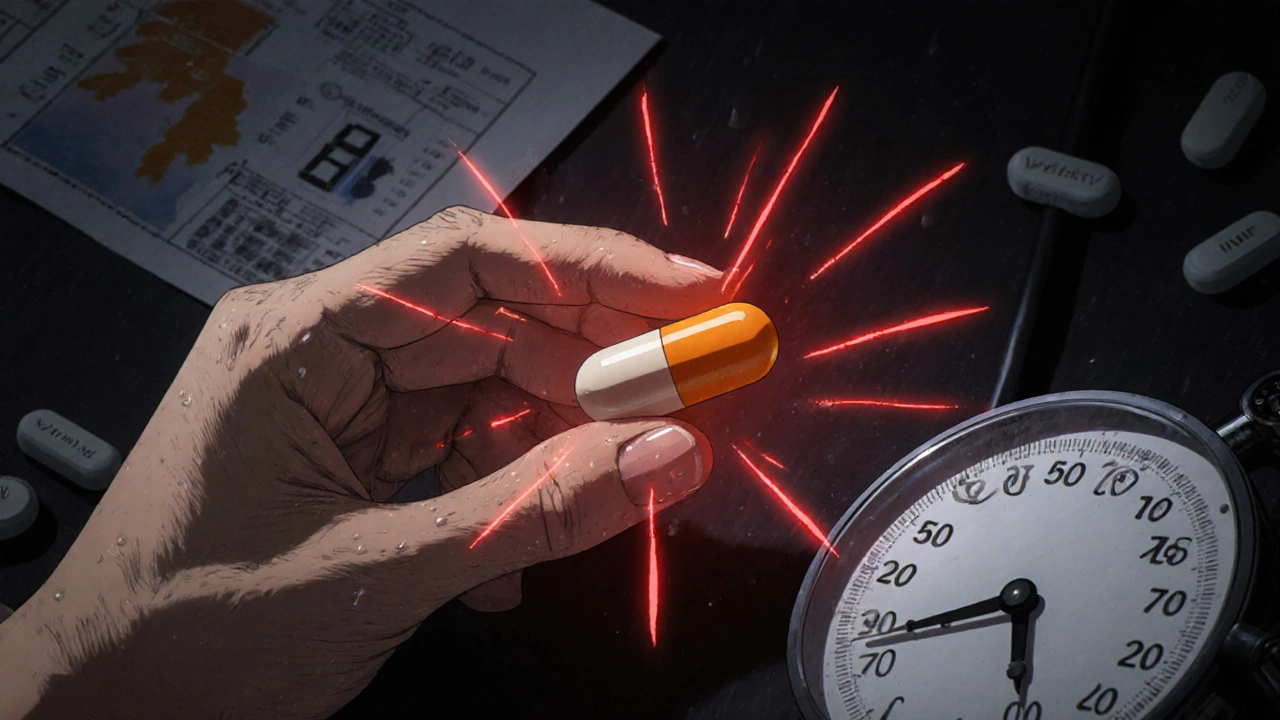Many people take turmeric for its anti-inflammatory benefits, believing it’s just a harmless spice. But if you’re on a blood thinner like warfarin, aspirin, or rivaroxaban, that daily sprinkle on your eggs or turmeric capsule could be putting you at serious risk. The science is clear: turmeric and its main active compound, curcumin, can dangerously amplify the effects of blood thinners - and the consequences aren’t theoretical. Real patients have bled internally after adding turmeric supplements to their routine. This isn’t a "maybe" or a "might." It’s a documented, life-threatening interaction.
How Turmeric Acts Like a Blood Thinner
Turmeric isn’t just coloring your curry yellow. Its power comes from curcumin, which makes up about 2% to 8% of raw turmeric root. But in supplements, that number can jump to 95%. Curcumin doesn’t just reduce swelling - it directly interferes with how your blood clots. Studies show curcumin slows down key steps in the clotting process. It inhibits thrombin and factor Xa, two proteins your body needs to form clots. It also reduces platelet aggregation, meaning your blood cells stick together less easily. This dual action is similar to how prescription drugs work - but without the safety controls. Unlike warfarin, which targets vitamin K, or DOACs like Eliquis that block factor Xa directly, curcumin hits multiple targets at once. That’s why it’s harder to predict. One person might take a small dose and feel nothing. Another might take the same amount and end up in the hospital with an INR of 10 - far above the safe range of 2 to 3.5 for warfarin users.Real Cases, Real Danger
In April 2018, Medsafe in New Zealand reported a case where a patient on stable warfarin therapy had their INR suddenly spike to over 10 after starting a turmeric supplement. That’s not a typo. An INR above 10 means a very high risk of spontaneous bleeding - even from minor bumps or coughing. The patient didn’t have liver disease, didn’t change their diet, didn’t start new antibiotics. The only new thing was turmeric. Another case involved a transplant patient taking tacrolimus, a drug that prevents organ rejection. After consuming 15 or more spoonfuls of turmeric powder daily for ten days, their tacrolimus levels jumped to 29 nanograms/mL - a toxic level. They developed acute kidney injury. Turmeric wasn’t just thinning their blood; it was interfering with how their body processed another critical medication. These aren’t outliers. The Welsh Medicines Information Centre (WMIC) updated its guidance in October 2024, confirming these interactions are real, repeatable, and dangerous. The same pattern shows up with other blood thinners: heparin, clopidogrel, enoxaparin, even over-the-counter NSAIDs like ibuprofen. The risk isn’t just with supplements. Even large amounts of turmeric in food - think daily golden lattes or heavy curry use - can tip the balance in sensitive individuals.Why Supplements Are Worse Than Spices
Eating turmeric in food is unlikely to cause problems for most people. A teaspoon of ground turmeric contains maybe 20-40 mg of curcumin. That’s not enough to trigger a major interaction. But supplements? That’s a different story. A single capsule can contain 500 mg of curcumin extract - that’s 10 to 25 times more than you’d get from a meal. And there’s no standardization. One brand might say it’s 95% curcumin; another might be 5%. You don’t know what you’re actually taking. No FDA-like oversight. No batch testing. No warning labels. The British Heart Foundation and Mayo Clinic both warn that high-dose turmeric supplements can act like blood thinners. And unlike prescription drugs, there’s no blood test to monitor how much curcumin is in your system. You can’t adjust your dose based on lab results. You’re flying blind.
Which Blood Thinners Are Most at Risk?
The interaction isn’t the same for every blood thinner, but some carry higher risk:- Warfarin (Coumadin): Highest risk. Warfarin has a narrow therapeutic window - a tiny change in dose can cause bleeding or clotting. Curcumin interferes with how warfarin is broken down in the liver, causing levels to build up.
- DOACs (rivaroxaban, apixaban, dabigatran): Still risky. Curcumin inhibits factor Xa, which is exactly what these drugs target. Combining them may double the anticoagulant effect.
- Aspirin, clopidogrel (Plavix): These are antiplatelet drugs. Curcumin also suppresses platelets, so together, they can cause uncontrolled bruising or bleeding.
- NSAIDs (ibuprofen, naproxen): These already increase bleeding risk. Adding turmeric makes it worse.
What Doctors Say - And What You Should Do
The message from medical authorities is consistent:- Medsafe (New Zealand): "Concurrent use... should be avoided."
- WMIC (UK): "Monitor closely if warfarin and curcumin are taken together."
- Mayo Clinic: "Turmeric in large doses can act like a blood thinner... Stop taking it at least two weeks before surgery."
- Healthline: "Always talk with a doctor before taking turmeric supplements."

Other Hidden Risks
Turmeric doesn’t just mess with blood thinners. It also affects how your body processes other drugs:- Tacrolimus: Levels rise dangerously - risk of kidney damage.
- Sulfasalazine: Concentrations in blood can triple, increasing side effects like nausea and liver stress.
- Norfloxacin: Animal studies show higher blood levels, suggesting possible antibiotic interactions.
- Diabetes medications: Turmeric can lower blood sugar, which may cause hypoglycemia when combined with insulin or metformin.
What to Do Next
If you’re on a blood thinner:- Stop all turmeric and curcumin supplements immediately.
- Tell your doctor or pharmacist you’ve been taking them - even if you stopped.
- Ask for an INR test if you’re on warfarin. If you’re on a DOAC, ask if monitoring is needed.
- Use turmeric in cooking only - no more than 1-2 teaspoons per day.
- Never start a new supplement without checking with your prescriber, even if it’s "natural."
Bottom Line
Turmeric isn’t a villain. Used as a spice in food, it’s fine. But as a supplement, especially if you’re on blood thinners, it’s a hidden hazard. The science is solid. The cases are real. The risk of bleeding - including brain bleeds - is high enough that medical regulators in multiple countries are issuing warnings. Your health isn’t worth gambling on. If you’re on a blood thinner, skip the capsules. Enjoy your curry. But don’t let a trendy supplement turn your kitchen spice into a silent threat.Can I take turmeric if I’m on warfarin?
No. Turmeric and curcumin supplements can significantly raise your INR, increasing your risk of dangerous bleeding. Even small amounts in supplements can cause your warfarin levels to spike. Stick to using turmeric as a spice in food - no more than a teaspoon a day - and avoid all concentrated supplements.
How long before surgery should I stop turmeric supplements?
Stop all turmeric supplements at least two weeks before any surgery, including dental procedures. Turmeric can increase bleeding during and after surgery, and many surgeons require patients to discontinue it well in advance. Always tell your surgeon and anesthesiologist about any supplements you’ve been taking.
Are there any blood thinners that are safe with turmeric?
No. All blood thinners - including warfarin, aspirin, clopidogrel, rivaroxaban, apixaban, and enoxaparin - carry interaction risks with turmeric. The mechanisms may differ, but the outcome is the same: increased bleeding risk. There is no known safe combination between turmeric supplements and any prescription anticoagulant or antiplatelet drug.
What’s the difference between turmeric spice and turmeric supplements?
Turmeric spice contains only 2-8% curcumin, so a teaspoon gives you about 20-40 mg - not enough to significantly affect clotting. Supplements often contain 500-1,000 mg of curcumin per capsule, which is 10-50 times more. That concentrated dose is what causes dangerous interactions. The spice is safe; the supplement is not.
I’ve been taking turmeric supplements for years. Should I be worried?
Yes. If you’re on a blood thinner, you should stop immediately and talk to your doctor. Even if you haven’t had symptoms yet, the interaction can build up over time. A sudden spike in INR can happen without warning. Get your INR checked if you’re on warfarin, and ask about any unexplained bruising or bleeding.
Can I take turmeric with other supplements like fish oil or garlic?
Not safely. Fish oil and garlic both have mild blood-thinning effects. Combining them with turmeric creates a cumulative effect that increases bleeding risk. Even if you’re not on prescription blood thinners, stacking multiple natural anticoagulants is risky. Talk to your doctor before combining any supplements.
Are there safer alternatives to turmeric for inflammation?
Yes. Omega-3 fatty acids from fish oil (in moderate doses), ginger, and boswellia have anti-inflammatory effects with lower interaction risks. However, even these should be discussed with your doctor if you’re on blood thinners. Physical therapy, weight management, and prescribed anti-inflammatories are often safer, more predictable options.

Rachel Wusowicz
November 15, 2025 AT 18:50So… let me get this straight: Big Pharma doesn’t want you to know that turmeric-a spice humans have used for 4,000 years-is a "dangerous interaction"? 😏 But they’ll sell you a $200/month pill that makes your kidneys scream and your liver cry? 🤔 Curcumin doesn’t just "interfere"-it’s your body’s natural alarm system screaming, "THIS ISN’T NATURAL!" And now they want you to stop the spice but keep the synthetics? I’m not taking my vitamins… I’m taking my revenge.
David Rooksby
November 16, 2025 AT 16:57Look, I get it, people are scared of supplements because they don’t understand biochemistry-but here’s the real issue: curcumin’s half-life is like 10 minutes, it’s poorly absorbed, and most commercial supplements are laced with piperine to boost absorption-which itself inhibits CYP3A4 and P-gp transporters, meaning you’re not just getting turmeric, you’re getting a pharmacokinetic grenade. And yeah, warfarin’s window is narrow, but so is the dose of curcumin in food. The problem isn’t turmeric, it’s the fact that nobody tests for drug-supplement interactions before they slap a "natural" label on a capsule and sell it for $30 on Amazon. If you’re on warfarin, sure, avoid the 1,000mg capsules-but if you’re drinking turmeric lattes and eating curry like a normal human being? Chill. The data’s not showing a population-wide bleeding epidemic, it’s showing a few people who didn’t tell their doctors they were popping pills like candy.
Melanie Taylor
November 18, 2025 AT 04:00OMG I JUST REALIZED I’VE BEEN TAKING TURMERIC CAPSULES FOR MY KNEES 😭😭😭 I’M ON PLAVIX TOO!!! I’M GOING TO CALL MY DOCTOR RIGHT NOW 😫🙏 I’M SO SCARED BUT ALSO SO GRATEFUL THIS POST EXISTED!! THANK YOU FOR SAVING MY LIFE 💖🩹
Teresa Smith
November 19, 2025 AT 15:23The danger here isn’t turmeric-it’s the normalization of unregulated pharmacological agents masquerading as wellness. The post correctly identifies the mechanism of interaction, cites regulatory warnings, and differentiates between culinary use and concentrated extracts. What’s missing is the systemic critique: the supplement industry operates in a regulatory vacuum. There is no FDA oversight, no standardized dosing, no pharmacovigilance. Consumers are treated as test subjects. This isn’t about fear-mongering; it’s about medical ethics. If you wouldn’t take a drug without a prescription, why take a supplement that behaves like one? The answer is simple: because we’ve been sold the lie that "natural" equals "safe." It doesn’t. It equals "untested." And that’s a risk no one should take without informed consent.
ZAK SCHADER
November 21, 2025 AT 01:28So some guy in New Zealand got his INR sky high after taking turmeric? Big deal. We got real problems here-like illegal immigration, woke schools, and Biden’s crypto scam. Why are we wasting time on some indian spice? I eat curry every Sunday and I’m fine. You wanna live in fear? Go live in Sweden. I’ll take my turmeric and my freedom.
Danish dan iwan Adventure
November 22, 2025 AT 15:05Curcumin inhibits CYP2C9 and CYP3A4 → alters warfarin metabolism. Also suppresses platelet activation via COX-1 and TXA2 downregulation. Evidence: PMID 25677891, 28426112. Supplement dose >500mg/day = clinically significant. Culinary use: negligible. Stop conflating dosage. Simple.
Ankit Right-hand for this but 2 qty HK 21
November 22, 2025 AT 22:08Typical western fearmongering. In India, we’ve eaten turmeric in every meal since the Vedic age. Our grandparents lived to 90 without a single INR test. Now you people take 10 pills a day and blame the spice? You’re weak. The real danger is your pharmaceutical addiction. Turmeric is the medicine you forgot you had. Stop listening to Western doctors who profit from your dependence.
Oyejobi Olufemi
November 23, 2025 AT 03:43You think this is about turmeric? No. This is about control. The medical-industrial complex fears anything that doesn’t require a prescription, a patent, or a profit margin. They’ve spent billions convincing you that your body is broken and needs their chemicals. Turmeric? A 5,000-year-old remedy that costs pennies? That’s a threat. The bleeding cases? Convenient anecdotes. The real epidemic is pharmaceutical-induced liver failure, GI bleeds from NSAIDs, and warfarin’s 20% annual hemorrhage rate. But you’ll keep swallowing your pills because you’ve been taught to distrust nature. You’re not sick-you’re programmed.
Daniel Stewart
November 24, 2025 AT 13:50There’s a deeper irony here: we’ve turned medicine into a binary choice-pharmaceutical or natural-as if truth exists only at the extremes. But biology doesn’t care about labels. It cares about dose, context, and individual variation. The same curcumin that might cause a dangerous INR spike in one person might do nothing in another. The answer isn’t blanket avoidance or blind faith. It’s personalized medicine. Monitoring. Dialogue. The real villain isn’t turmeric. It’s the assumption that one-size-fits-all advice can ever be safe in a world of human complexity.